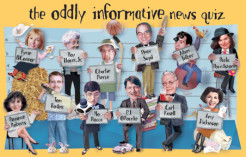I’m hesitant to say that I’ve discovered a new phenomenon, because perhaps it’s been around for a while and I’m just horribly inattentive. I’ve missed other, fairly obvious cultural changes before, so it’s not uncommon.
But this phenomenon is new to me.
I was attending a meeting a few months ago, run by a fairly important person and dealing with fairly important matters, and throughout the entire meeting, two of the attendees were knitting. They had an entire back table set up for themselves, complete with balls of yarn, knitting needles, and even a basket of knitting paraphernalia.

Please don’t get me wrong. The two women in question were certainly paying attention to the proceedings and even participating in the discussion, but they were knitting as well.
Then a few weeks ago I attended a workshop and encountered the same thing. Three women in the back, knitting needles flying, listening attentively.
Last week I attended a children's orchestral concert and encountered the same damn thing. Women sitting in their seats, listening to the music, and knitting.
I’m not sure how to feel about this.
That’s not true. I know exactly how I feel about it, but I’m just not sure if my feelings are justified.
I’m offended by this behavior, and not because I think that these women should not be able to knit while listening to a discussion or music. I am offended because there is nothing in my multi-tasking arsenal that has been deemed socially appropriate that would allow me the flexibility or freedom that these women have.
And it’s just not fair.
Somehow these women have found a way to make knitting an acceptable activity while focusing attention elsewhere. But it’s not as if these women are darning socks for the poor or knitting sweaters for their tragically sweater-less children. These women are knitting because they enjoy it, and it really irritates me.
I don’t knit, and please don’t suggest that I take up knitting in order to solve this problem. I’m happy that people can find joy in this activity. My wife knits, and she loves it. But as long as there are people who are willing to knit so that I can go to the store and purchase a sweater, I have better ways to spend my time.
Even if I wanted to, I doubt that I could learn how to knit. My visual-spatial limitations are astounding.
But with a lifetime of endless meetings, workshops, classes, and concerts ahead of me, I’d like to be able to find something as acceptable and productive to keep me busy as knitting, but I have yet to find anything to fill this space.
For example, when I find myself in a wireless environment, I could certainly be playing poker online while listening. In fact, I’m playing poker as I type. Since I fold six out of every seven hands that are dealt to me, this has proven to be a very simple and enjoyable task that I can handle while doing most other things. I’ve made $23 in the last 40 minutes that I’ve been sitting at my desk, reading and writing this post. But to open up this software and start betting in a meeting would be socially unacceptable, and depending upon the setting, occupational suicide, even though I would argue that poker requires less sustained mental energy from me than knitting does for these women who literally set up shop in the back of rooms.
And how about reading? While certainly not conducive to meetings, what’s wrong with doing a little reading while listening to a concert? People read in coffee shops while a soloist is performing.
Hell, the band played on while people piled into lifeboats aboard the Titanic. Why not allow the audience at a classical music performance to read while listening?
I recently attended a social media conference in Boston. Over the course of two days, I attended about eight different workshops, and in each one, attendees were encouraged to be actively engaged on their laptops while listening and participating. We relayed content throughout the conference via Twitter, blogged about the content on their own personal websites, and conducted research on the topics begin presented and shared this research during the workshop. As the speakers presented, people pecked on their keyboards and no took offense. For this small, geeky segment of the population, the understanding that one can be listening to a speaker while engaged on a laptop was understood and embraced, and as a result, many ideas were shred between the workshops.
But other than an event centering on social media, populated by a bunch of geeks, I do not see this opportunity coming in my near future.
So I oppose knitting in meetings, concerts and similar circumstance. It's a selfish, petulant position born from envy and frustration, but I don't care. I'm formed opinions on a lot less.









